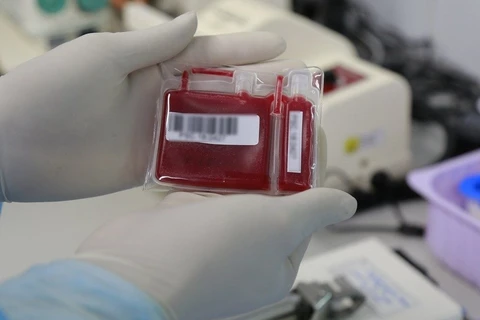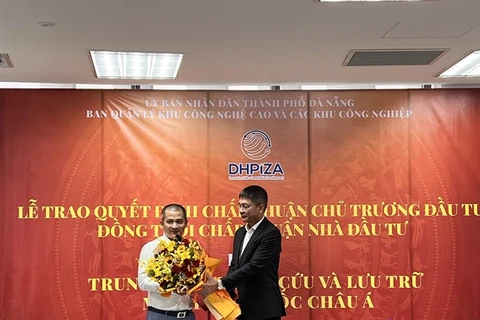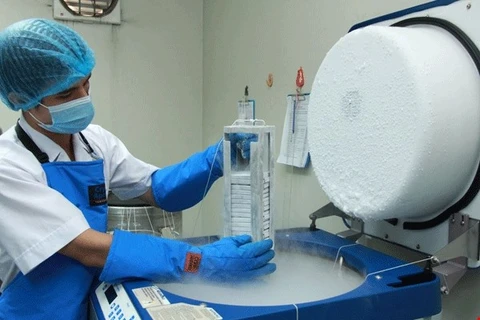 Community cord blood stem cell storage at the Community Cord Blood Stem Cell Bank, National Institute of Hematology and Blood Transfusion. (Photo: VNA)
Community cord blood stem cell storage at the Community Cord Blood Stem Cell Bank, National Institute of Hematology and Blood Transfusion. (Photo: VNA) This initiative is part of Project 1816 by the Ministry of Health aimed at supporting lower-level hospitals in enhancing the quality of medical examination and treatment.
Medical personnel from Nghe An General Friendship Hospital, Phu Tho Provincial General Hospital, and Thai Nguyen Central Hospital have participated in the course. Over eight weeks, doctors and nurses receive theoretical training and hands-on guidance on the autologous stem cell transplant procedure at the Stem Cell Transplant Department, in the Stem Cell Bank of the Institute.
According to the National Institute of Hematology and Blood Transfusion, hematopoietic stem cell transplantation is an optimal treatment that can help many people suffering from both malignant and benign blood diseases, giving them the opportunity to recover and resume a normal life. However, this technique is complex and requires strict adherence to procedures to ensure the highest professional standards.
Autologous stem cell transplantation involves the collection and storage of the patient's own stem cells, which are then reinfused to restore hematopoietic tissue. Successful implementation of autologous stem cell transplantation necessitates meticulous preparation and collaboration with experts. Participation in training and technology transfer serves as an initial step in preparing human resources for lower-level healthcare facilities.
Thanks to the support and technology transfer provided by the National Institute of Hematology and Blood Transfusion, Nghe An General Hospital and Da Nang Hospital have successfully performed their first autologous stem cell transplants.
Prior to these procedures, experts from the Institute conducted surveys and consultations to ensure the readiness of facilities, as well as their equipment, drugs, chemicals, and other necessary resources for the transplantation process.
During the first transplant procedure, the Institute's experienced staff directly supervised and performed tasks such as stem cell separation, stem cell transfusion, and close monitoring of the patient's progress. This included ordering tests, adjusting medications, and promptly addressing any complications that arose.
The National Institute of Hematology and Blood Transfusion holds a leading position in the country as a specialised facility for receiving and storing cord blood stem cells, conducting pre-transplant testing, monitoring stem cell transplantation outcomes, and implementing hematopoietic stem cell transplantation to treat haematological diseases.
The Institute has been conducting autologous stem cell transplants since 2006. As of June 2023, they have successfully performed over 570 hematopoietic stem cell transplants using various complex techniques and cell sources. These sources include different types of stem cells, such as cord blood stem cell transplants (both with matching and non-matching blood types) and half-matching transplants (haplotype transplants) combined with cord blood stem cells. The application of stem cell transplantation techniques continues to expand, enabling the treatment of a wider range of diseases and extending the age limit for transplantation.
As a leading specialised institution, the National Institute of Hematology and Blood Transfusion is committed to providing support and transferring advanced technologies that are suitable for the conditions of lower-level hospitals, including autologous stem cell transplantation techniques. This activity contributes to improving the quality of diagnosis and treatment in various regions throughout the country, thereby enhancing access to better healthcare services for patients in their local communities./.
VNA






















